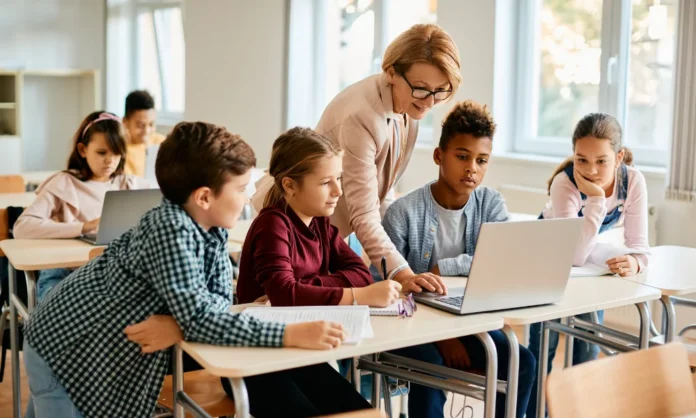Education in 2025 is undergoing a profound transformation, driven by technology, innovation, and evolving learner needs. From primary schools to higher education and professional training, educators and institutions are embracing digital tools, personalized learning, and sustainable practices.
The goal is to create more inclusive, engaging, and effective learning experiences that prepare students for a rapidly changing world.
This article explores emerging trends, digital tools, pedagogical strategies, challenges, and opportunities shaping education in 2025.
The Evolution of Education
Historically, education relied on standardized curricula, classroom instruction, and traditional assessments. While effective in many ways, these methods often failed to accommodate individual learning styles, real-world skills, and rapid technological change.
In 2025, education emphasizes flexibility, accessibility, and experiential learning. Blended learning, online platforms, and AI-driven solutions allow students to learn at their own pace, explore interests, and acquire skills relevant to the modern economy.
Key Trends in Education in 2025
- Digital and Blended Learning
Digital learning tools are now integral to education. Learning Management Systems (LMS), virtual classrooms, and interactive apps enhance accessibility and engagement. Blended learning — combining online and in-person instruction — provides flexibility while retaining the benefits of face-to-face interaction. - Personalized and Adaptive Learning
AI and data analytics enable personalized learning paths. Adaptive software identifies student strengths, weaknesses, and learning preferences, adjusting content and assessments accordingly. Personalized learning ensures that every student progresses at an optimal pace, improving retention and engagement. - STEM and STEAM Focus
STEM (Science, Technology, Engineering, and Mathematics) remains central, while STEAM (adding Arts) integrates creativity and critical thinking. This approach equips students with analytical, technical, and innovative skills needed in a competitive global economy. Coding, robotics, AI, and design thinking are now core components of curricula. - Gamification and Interactive Learning
Gamification engages students through game-like elements such as challenges, points, and rewards. Interactive simulations, virtual labs, and educational games make learning experiential, enjoyable, and memorable. - Lifelong Learning and Upskilling
Education in 2025 extends beyond traditional schooling. Lifelong learning programs, professional certifications, and online courses enable adults to upskill, reskill, and stay competitive. Digital platforms like Coursera, Udemy, and LinkedIn Learning provide flexible learning opportunities for personal and professional growth.
Technology in Education
- Artificial Intelligence
AI is transforming education by providing personalized tutoring, grading automation, predictive analytics, and curriculum optimization. AI chatbots assist students with queries, while data analytics inform educators about performance trends and intervention strategies. - Virtual and Augmented Reality (VR/AR)
VR and AR create immersive learning experiences. Students can explore historical events, scientific phenomena, or complex machinery virtually, enhancing understanding and engagement. VR and AR also support remote learners by replicating interactive classroom environments. - Online Collaboration Tools
Platforms such as Zoom, Microsoft Teams, and Google Workspace facilitate communication, collaboration, and project-based learning. Students can work in global teams, develop soft skills, and engage in real-world problem-solving. - Blockchain for Education Credentials
Blockchain technology ensures secure, verifiable digital certificates, transcripts, and credentials. This technology reduces fraud, simplifies verification, and increases transparency for employers and institutions.
Inclusive and Accessible Education
Education in 2025 emphasizes inclusivity and accessibility. Digital tools support students with disabilities, while multilingual resources cater to diverse populations. Policies and practices promote equal opportunities for learners regardless of socioeconomic background, location, or physical ability.
Challenges Facing Education
- Digital Divide: Unequal access to devices, internet, and technology hinders learning opportunities for many students.
- Teacher Training: Educators must continuously update skills to leverage technology and new pedagogical methods.
- Mental Health: Balancing screen time, academic pressure, and social interaction is essential for student well-being.
- Curriculum Relevance: Ensuring curricula match evolving workforce needs and technological advancements is critical.
Opportunities in Modern Education
- Global Learning Communities: Students can collaborate internationally, sharing knowledge and perspectives.
- EdTech Startups: Innovative platforms create engaging, personalized, and accessible learning experiences.
- Hybrid Work and Study Models: Flexible schedules support lifelong learning and workforce integration.
- Research and Innovation: Schools and universities are hubs for innovation, fostering problem-solving and creativity.
The Role of Parents and Community
Parents and communities play an active role in education. Supportive environments, mentoring, and engagement with digital tools enhance learning outcomes. Community-driven initiatives, such as local libraries, workshops, and STEM clubs, supplement formal education and create holistic learning experiences.
The Future of Education
The future of education in 2025 and beyond is shaped by:
- Technology Integration: AI, VR/AR, and blockchain will continue enhancing personalized learning and credentialing.
- Focus on Skills and Competencies: Critical thinking, problem-solving, creativity, and emotional intelligence will be as important as academic knowledge.
- Sustainable and Inclusive Practices: Education systems will prioritize equity, accessibility, and environmental awareness.
- Global Connectivity: Collaborative learning across borders will prepare students for international opportunities and cultural competence.
Conclusion
Education in 2025 is dynamic, personalized, and technology-driven. It emphasizes not only academic excellence but also life skills, creativity, and adaptability. By integrating digital tools, innovative pedagogies, and inclusive practices, modern education equips students to thrive in a complex, interconnected world.
From personalized learning paths to immersive VR experiences, the future of education promises accessibility, engagement, and meaningful knowledge. It empowers learners to reach their full potential while preparing them for careers, challenges, and opportunities in the modern era.
Source: Hot FM Online
